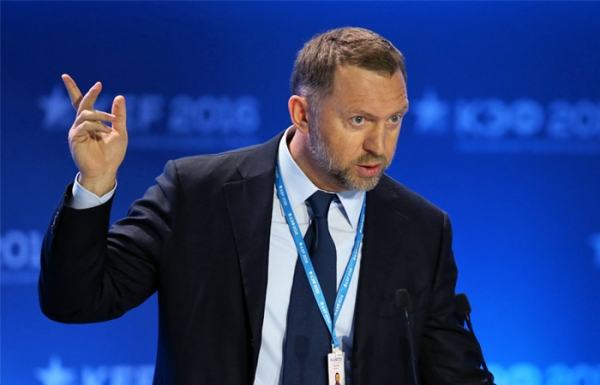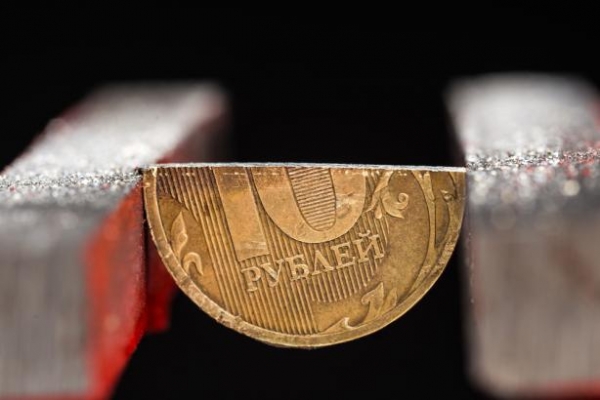
President of “RUSAL” Oleg Deripaska
Photo: TASS, Artyom Korotayev
The Krasnoyarsk economic forum this year was conceived by the organizers as a platform to discuss future strategy-2030, which should be taken in the middle of this year.
The discussion took place in the first main day of the forum with the participation of Deputy Prime Minister Arkady Dvorkovich. On its results it is possible to state once again: a set of measures, needed for Russia’s sustainable economic growth is obvious, but does she have the desire and the capacity to implement them is the big question.
Headlining the plenary session was moderated by Oleg Deripaska. The main owner of RUSAL habitually criticized the monetary policy of the Central Bank, called for the dismantling of capitalism, decentralization of the decision-making system, judicial reform, the development of domestic demand and the debt market. Less than a month ago, the businessman had expressed similar thoughts at the forum in Davos, Switzerland, now denounced them to the audience in the “home” for RUSAL Krasnoyarsk Krai.
Deripaska against capitalism
The main trouble of the Russian economy Deripaska called dependence on external factors. Times sverhsekretnoj conditions on markets of raw materials gone forever, you need to stop praying on oil prices, because in the new reality and oil for $18, and a dollar for 100 rubles – is not fantasy, intimidated the audience Deripaska.
“If we want to end capitalism, we must build a decentralized model based on private business,” he said. You need to change the OST and make available credit resources, create new ones, including the state, banks, as the after cleaning conducted by the Central Bank, the tone at the market ask only two players (Sberbank and VTB – Interfax), which leads to monopolization and growth rates, said Deripaska. “The number of subjects (banking market – Interfax) should be at least eight,” said the businessman.
According to Deripaska, bonded rates lead to the contraction of domestic demand , the Central Bank, pursuing its policy of waiting for foreign investments, but “they will not come until there is no growth”. You need to create an efficient debt market, to develop municipal borrowing, and necessary tax reform. “The system that Kudrin (former Minister of Finance Alexey Kudrin – Interfax) set for collecting taxes in the Treasury, should be dismantled,” – said the businessman.
Deripaska urged not to be afraid of budget deficit – he let in the first three years will amount to 10% of GDP: “we need to put fiscal deficits on the debt market”.
Instead of privatization of state-owned companies for a song need to be released from non-core assets by selling to small and medium businesses, said Deripaska.
“The import substitution model of the 19th century, I don’t believe in this mantra. You need to go for export”, – said the head of “RUSAL”. According to him, the export potential, first of all, you can develop in obvious ways – agriculture, processing of raw materials – oil, gas, chemistry, metals.
The idea of export diversification at the expense of non – primary sectors the most, according to the survey, while not believe. The most votes was scored by the thesis about the need for the rational use of resources. The General Director “the pole Gold” Pavel Grachev, noted that before focusing on high technologies, need to reach acceptable production parameters in traditional industries. “The state should promote efficient production, not to subsidize inefficient industries to diversify,” he says.
“When we say that we need to change the structure of the economy away from commodity rents, but they all believe that the point of economic growth is sustainable use of natural resources, not technology, telecommunications or the Internet, I understand that we have cognitive dissonance” – commented the Minister for open government Mikhail Abyzov.
In his opinion, the Russian economy should grow by 4-6% per year, but domestic demand for this is not enough we need to export products and new technologies. “This market is very competitive. Who awaits us there? It is necessary to answer this question. It should be not just products with added value, and innovation,” he said.
To a new economic model based on private business, to work, needs a new judicial reform, because what is happening in the courts, “unexplainable”, noted, in turn, Deripaska. “The entrepreneur must go to court and get a fair decision. This is the end all corruption,” he said.
Finally, for the future development of the country is very important “to settle Moscow” – funnel commodity boom was prolonged to too many people. “Each time, approaching the capital, I think: what are these people doing? We need to think about how to engage in the economy human capital from Moscow”, – said the businessman.
The moderator of the session, the rector of the Moscow school of management SKOLKOVO and Deputy economic development Minister 1997-2007 Andrei Sharonov after the speech Deripaska admitted that experiencing deja vu is a country in the early 2000s fostered the debt market, is selling state assets and reduced its role in the economy, but in the end the economic situation in Russia described a circle and returned to the dirigisme. The result is obvious, Deripaska has acknowledged through the state and its institutions was the easiest way to redistribute oil rents. Part of the blame he laid on the people and businesses who supported such a policy. “We need more such errors not to do, and give them access to private capital,” concluded Deripaska.
Present in the room supported the point of view of the billionaire low availability of credit resources, administrative barriers and low quality of bureaucracy called the most serious problems for business 75% of participants of the electronic survey.
The General Director of “E. on Russia” Maxim Shirokov also supported Deripaska in part required the establishment of a decentralized model of economic management. However, while “more attempts to toughen the parameters of the regulation,” he complained.
Man – it sounds proudly
Other participants – the rector of Ranepa Vladimir Mau and the rector of the SKOLKOVO Institute of science and technology Alexander Kuleshov – talked a lot about the importance of human capital, development of education, science and culture. Professor HSE Alexander Arkhangelsky argued about the danger of slipping public culture in the archaic and Hobbies traditionalism at the expense of modernization. In this connection, he drew attention to how little the women in the room and the disabled. However, more voters – 38 percent – in the online survey gathered the idea that the cultural traditions of Russia will contribute to the development. The opposite view is supported by 17.3 percent of the audience, and another 5.1% of respondents believes that the existing cultural tradition will be overcome in the course of economic development.
This result upset the Minister Abyzov. “The whole world says that innovative development is possible only in a very tolerant state, and Russia is not. We have only recently become accustomed to people in wheelchairs in public places, only begins to form this culture, including through public policy. However, we believe that our cultural traditions will help us in economic growth, although they are absolutely not tolerant. I don’t believe it and was greatly surprised (by the results of the vote – Interfax)”, – said Mikhail Abyzov.
The draft strategy is still far from being ready, you must discuss it with the community and experts to make a real working document, he said. “There is a great danger that our colleagues from the Ministry of economic development within the deadline will make a huge document, which will be held public and expert discussion, and will be a collection of all good against all bad. But it will be a stillborn product that nobody needs,” said Abyzov.
According to him, the strategy 2030 should not be a government strategy, it “should describe the main characteristics, social, economic and public institutions, their target state”. “She needs to answer the questions, what resources are mobilized to achieve goals. Will we focus only on the redistribution of public resources, to build on the capabilities of the budget system, planning our development, or we will think how to involve private capital – both Russian and international,” said Abyzov. “The center strategy should be. If people won’t see strategy in its place, it will not work”, – he added.
Russia is all warmed up, teach and feed
Summary of the discussion made Arkady Dvorkovich. He was deployed to comment on their point of view on the future of the Russian economy, noting that the government should “do what it promises”. “This creates trust. When you trust are investing in the future. Without them we cannot live. Do not be afraid to invest, including the state, if it brings results,” said Deputy Prime Minister.
“The Finance Ministry’s approach doubt: we have a forecast of the economy was minus 2%, income will be as much, so there are no resources for investments. But if there will be investments, there will be not a minus, but plus 2%. And will return”, he said. “There is no need to invest more than it is possible, but reasonable rational investment of public and private sector can bring about positive growth”, – said Dvorkovich.
He supported the thesis of decentralized solutions and a Central place in economic life: “the state must enable a person to earn”.
At the end of his speech, Arkady Dvorkovich, Alexander Arkhangelsky, noting that Russian society, though Patriarchal, “but the main work is done by women”. “And Russia itself already warms the world with their energy, can feed and teach him. Russia is a woman, and can do a lot, and it seems to me that such a strategy can be successful,” the Prime Minister ended philosophically.
Andrei Sharonov was not able during the discussions to escape the feeling of deja vu. “All that’s sound, and it is necessary to understand the nuances that move us from the goal, while the object itself does not cause further debate,” he concluded, puzzled.








